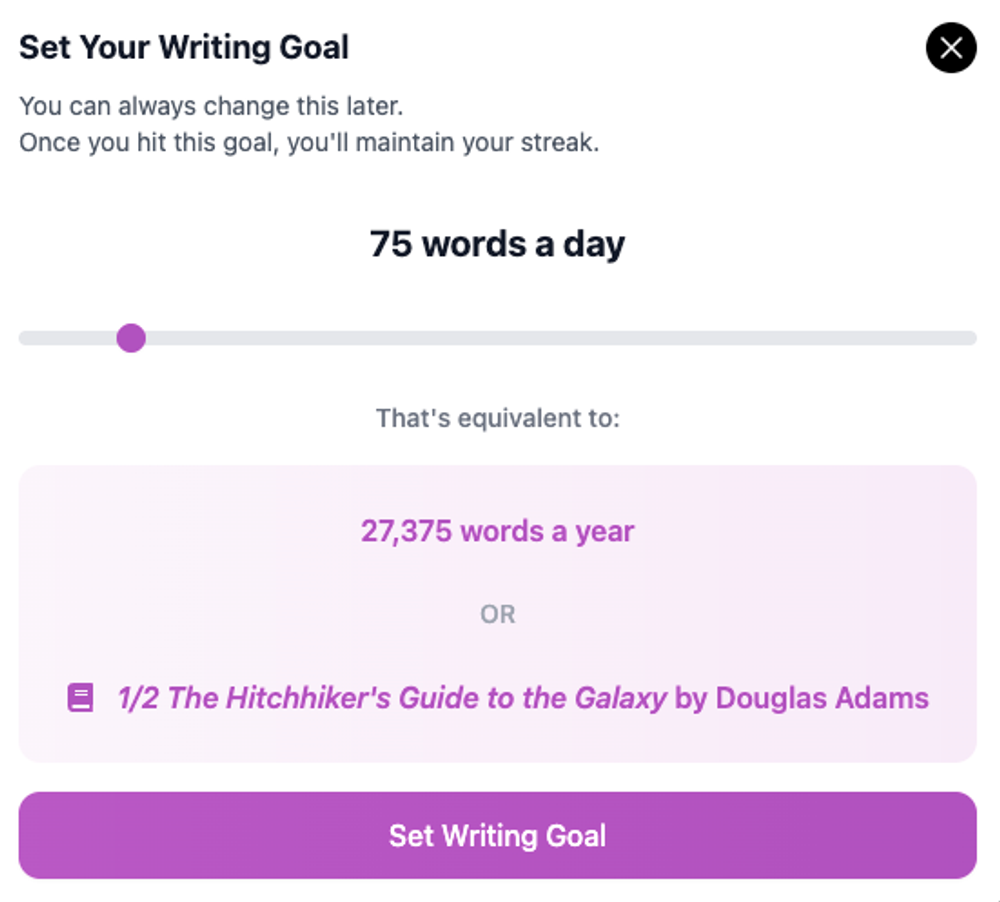Published in announcements
How to Build a Daily Writing Habit (and Stick to It)

Building a daily writing habit isn’t just about discipline—it’s about creating a sustainable rhythm that fits into your life. Writing every day helps you hone your skills, build confidence, and make steady progress on your projects. The trick isn’t just starting but sticking with it long enough for it to become second nature.
Below are seven tips for making it happen:
1. Start small (seriously, small!)
One of the biggest mistakes new writers make is setting massive, unsustainable goals. Don’t aim to write 2,000 words every day if you’re not used to it. Start with something manageable—like 100 words or 10 minutes a day.
The key is consistency, not volume. Writing just a little each day proves to yourself that you can show up. Over time, your output will grow naturally as the habit strengthens.
Daily Prompt lets you set a daily word count goal and gives you a creative writing prompt each day to inspire you to reach it.

2. Make it part of your routine
In Atomic Habits, James Clear calls this technique “habit stacking,” and it’s a simple but powerful way to make a new habit stick. The idea is to attach your writing habit to something you’re already doing every day.
For example:
- “After I pour my morning coffee, I’ll write for 10 minutes.”
- “When I finish dinner, I’ll spend 15 minutes journaling.”
- “After my daily workout, I’ll brainstorm a scene for my story.”
By pairing writing with an established habit, you create a natural trigger that reminds you to sit down and write. Over time, this pairing makes writing feel like a seamless part of your day.
3. Create a writing space
It doesn’t need to be a fancy desk with candles and plants (unless that’s your vibe!). A cozy chair, a corner of your kitchen table, or even a spot in your favorite café can work. The goal is to have a location where your brain knows: This is where the writing happens.
Minimize distractions if you can—silence your phone, close unnecessary tabs, and let others know that this is your time to focus.
4. Embrace the messy first draft
One of the hardest parts of building a daily habit is battling perfectionism. You might think, “This is garbage, why bother?” But here’s the truth: first drafts are supposed to be messy (or shitty, as Anne Lamott calls them).
Let go of the pressure to write perfectly and focus on just getting words on the page. You can always edit later. In fact, many professional authors say that the real magic happens in revision, not in drafting.
Suffering from writer's block? Our Plot Builder can be a great tool to get unstuck and get things moving. Use it to generate custom writing prompts tailored to your story idea.
5. Find accountability
It’s easier to stick to a habit when someone’s cheering you on. Share your goal with a friend or join a writing community. Within Daily Prompt, you can connect with fellow writers and find daily inspiration and encouragement to keep going.
It’s easier to stick to a habit when you have a way to track your progress which is why we introduced writing streaks: every day you write, your streak grows. Writing streaks give you a visual reminder of your consistency and make you think twice about skipping a day.
6. Reward yourself
Building a habit is hard work, so don’t forget to reward yourself when you hit your daily goals or make progress toward your larger writing dreams. Positive reinforcement helps your brain associate writing with enjoyment, not just effort.
Your rewards don’t have to be extravagant. Simple treats, like savoring your favorite snack, taking a guilt-free break to binge an episode of your favorite show, or going for a relaxing walk, can make a big difference. The key is to tie the reward to your writing accomplishment so it feels earned.
7. Be kind to yourself
Miss a day? It’s okay! Life happens. What matters is that you pick up where you left off and keep going. Writing is a long-term game, and one skipped day won’t ruin your progress.
Rather than beating yourself up, focus on what went wrong and how you can adjust. Did you overbook your schedule? Were you too tired? Learn from it and move forward.
Building a daily writing habit isn’t about willpower alone—it’s about finding what works for you and making it as easy as possible to show up consistently. Start small, be kind to yourself, and celebrate your progress.
Every word you write is a step closer to your goals. Whether it’s crafting a novel, a collection of short stories, or just exploring your creativity, the habit of daily writing can transform your life.